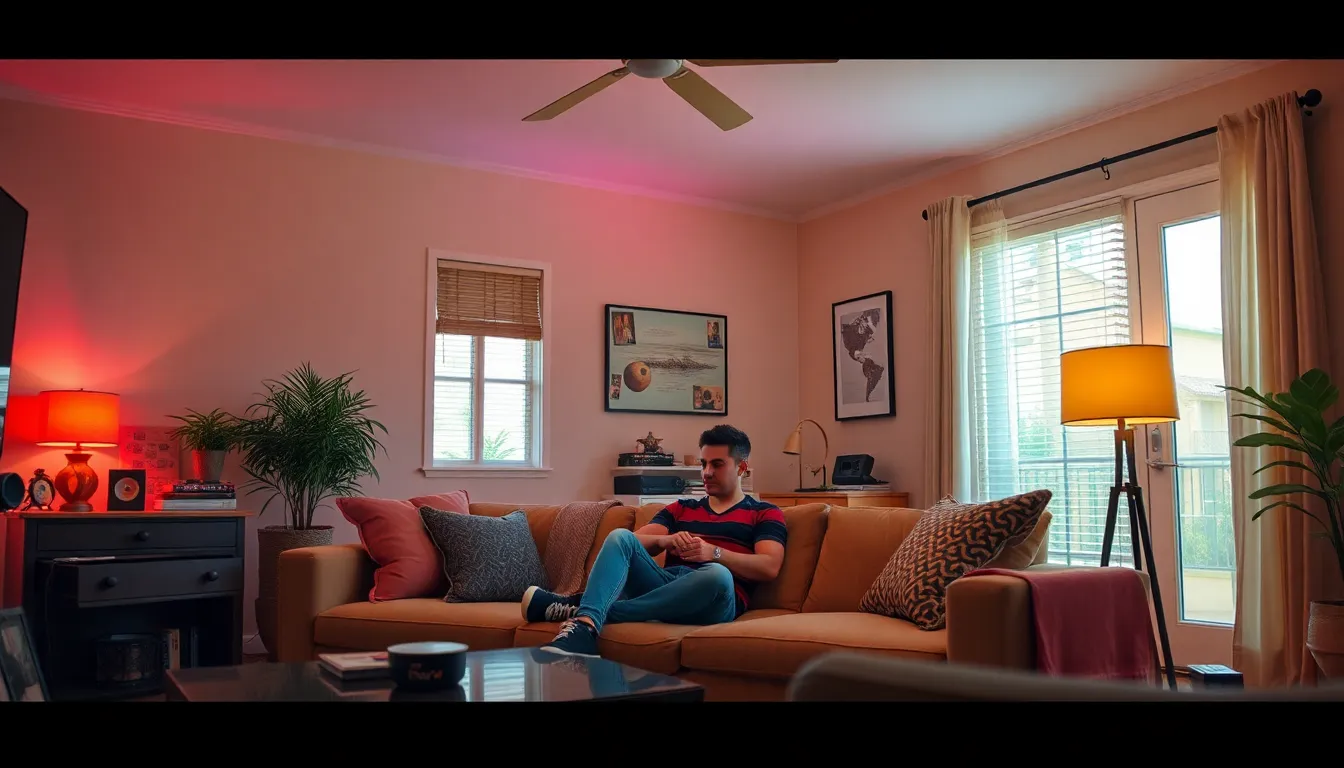Table of Contents
ToggleIn a world where your coffee maker can send you a motivational quote while brewing your morning cup, lifestyle technology is no longer just a buzzword—it’s a game changer. Imagine a life where your fridge reminds you when you’re out of snacks and your fitness tracker nudges you to take a break from binge-watching that new series. It’s like having a personal assistant who knows you better than your best friend.
Overview of Lifestyle Technology
Lifestyle technology encompasses a range of smart devices that enhance daily living. Smart coffee makers brew coffee on a schedule, while smart refrigerators maintain food freshness and provide recipe suggestions. These devices offer convenience throughout the day, making routines more efficient.
Technology improves personal well-being by promoting healthier habits. Wearable fitness trackers monitor activity levels and sleep patterns, providing insights that motivate users to adopt fitness goals. Smart home assistants facilitate hands-free control of home systems, simplifying management of everyday tasks.
Enhanced connectivity among devices plays a crucial role in lifestyle technology. IoT (Internet of Things) supports seamless communication between gadgets, allowing users to customize their experiences easily. For instance, voice-controlled lighting systems adjust brightness based on user preferences, creating optimal atmospheres for relaxation or productivity.
Customization options abound with lifestyle technology. Smart thermostats learn user behavior to optimize energy consumption, saving money while increasing comfort. Home security systems, equipped with cameras and sensors, provide real-time notifications for added peace of mind.
Incorporating lifestyle technology can transform mundane routines. Automated reminders for hydration or exercise help users stay on track with wellness goals. By integrating these innovations, individuals enhance their daily living experiences, leading to improved productivity and overall satisfaction.
Categories of Lifestyle Technology

Lifestyle technology encompasses various categories that enhance efficiency and well-being in everyday life. Three prominent categories include smart home devices, wearable technology, and health and wellness apps.
Smart Home Devices
Smart home devices revolutionize domestic living by automating tasks. Smart speakers like Amazon Echo enable voice-activated controls for music and information. Security cameras provide remote monitoring, empowering homeowners with peace of mind. Smart thermostats, including the Nest Learning Thermostat, adjust temperatures based on user habits, saving energy and money. Additionally, smart lighting systems allow users to customize ambiance, creating tailored environments for relaxation or productivity.
Wearable Technology
Wearable technology plays a crucial role in personal fitness and health tracking. Fitness trackers like Fitbit monitor physical activity, sleep quality, and heart rate, encouraging users to meet wellness goals. Smartwatches integrate features such as notifications and GPS, promoting connectivity while on the go. These devices also offer guided workouts, making it easier for individuals to maintain their exercise routines. Innovations in wearable health monitors continue to emerge, like glucose monitors for diabetics, further enhancing individual health management.
Health and Wellness Apps
Health and wellness apps provide tools for managing lifestyle choices effectively. Applications like MyFitnessPal track nutrition and caloric intake, supporting dietary goals. Meditation apps, such as Headspace, help users cultivate mindfulness and reduce stress through guided sessions. Additionally, fitness apps like Strava facilitate social interaction by connecting users with friends for challenges and motivation. These technologies foster healthier habits, enabling users to prioritize wellness amid busy schedules.
Benefits of Lifestyle Technology
Lifestyle technology significantly enhances daily living. Users experience improved convenience and effective health management through the integration of smart devices.
Enhanced Convenience
Smart home devices streamline daily tasks. Automated coffee makers brew coffee at preferred times, while smart refrigerators suggest meals based on available ingredients. Voice-controlled assistants manage various functions, reducing the need for manual interaction. Additionally, programmable lighting can adjust brightness automatically, catering to individual preferences. These features save time and create a more comfortable living environment. Users enjoy a seamless experience as interconnected devices communicate effortlessly through the Internet of Things. Enhanced convenience leads to more efficient routines, allowing individuals to focus on other important aspects of life.
Improved Health Management
Wearable technology plays a vital role in health monitoring. Fitness trackers record physical activity levels, encouraging users to move more throughout the day. Sleep monitoring features provide insights into rest patterns, helping improve sleep quality over time. Health and wellness apps offer personalized nutrition tracking, enabling people to make informed choices about their diets. Users gain access to a wealth of information about their overall health, leading to more proactive health management. Lifestyle technology empowers individuals to maintain wellness goals through reminders and social sharing, further motivating healthier lifestyle choices.
Challenges and Considerations
Considering the rapid integration of lifestyle technology, certain challenges must be addressed.
Privacy and Security Concerns
Privacy issues arise as smart devices collect vast amounts of personal data. Users often express concerns about data breaches and unauthorized access to sensitive information. Many devices, like smart speakers and health trackers, require constant internet connectivity, increasing vulnerabilities. Encryption and secure user authentication are essential to protect this data. Companies must implement robust security measures to gain user trust and ensure privacy. Ethical data usage should be a priority for developers as well, fostering transparency in how information is handled.
Technology Overload
Technology overload can occur as users juggle multiple devices and apps. Many individuals feel overwhelmed by constant notifications and updates from various platforms. The abundance of lifestyle technology may inadvertently disrupt daily routines rather than enhance them. Users may find it challenging to balance device usage with personal interactions, leading to disengagement from real-world experiences. Mindful integration of technology into daily life promotes healthier habits and reduces stress. Establishing boundaries around device use is crucial for maintaining well-being and productivity.
Future Trends in Lifestyle Technology
Emerging trends in lifestyle technology point toward enhanced personalization and automation. Smart environments are becoming the norm, allowing homes to adapt dynamically to individual needs. Integration of artificial intelligence in smart devices enables advanced learning from user behavior, enhancing tailored experiences.
Voice recognition technology is anticipated to improve significantly, making interaction with devices more intuitive. Devices that understand context will increasingly respond to voice commands without requiring specific phrasing. Smart home ecosystems will likely see a surge, with devices communicating seamlessly to optimize energy consumption and enhance security measures.
The rise of augmented and virtual reality technologies will offer new dimensions in fitness and wellness. Innovative fitness apps may simulate real-life environments, engaging users in interactive workouts. Social connectivity through these platforms can enhance motivation, promoting a community atmosphere that aligns with personal health goals.
Wearable technology is evolving towards more accurate health monitoring capabilities. Advanced sensors will allow wearables to monitor not just activity levels but also physiological metrics, like hydration or stress levels, encouraging proactive wellness management.
Health and wellness apps are set to evolve in terms of features that support mental health. Incorporating guided meditation or stress-reduction techniques directly in daily planning can help users maintain balance in increasingly hectic lives.
Sustainability will also be a focal point in lifestyle technology. Products designed with eco-friendliness in mind will cater to consumers who prioritize environmental impact. The connection between lifestyle technology and sustainable practices can lead individuals toward a more conscientious way of living.
Overall, future trends indicate an increasingly interconnected, eco-conscious approach to lifestyle technology, promising to enhance the quality of daily living experiences.
Lifestyle technology is reshaping how individuals approach daily living. With smart devices streamlining tasks and promoting health, users can enjoy enhanced convenience and well-being. The interconnectedness of these technologies fosters a more personalized and efficient experience, allowing for seamless integration into everyday routines.
As advancements continue, the focus on sustainability and mental health will further elevate the role of lifestyle technology. Embracing these innovations can lead to a more balanced and fulfilling lifestyle. By being mindful of the challenges that come with integration, users can harness the benefits while maintaining a healthy relationship with technology. The future holds exciting possibilities for those willing to adapt and explore the evolving landscape of lifestyle technology.





